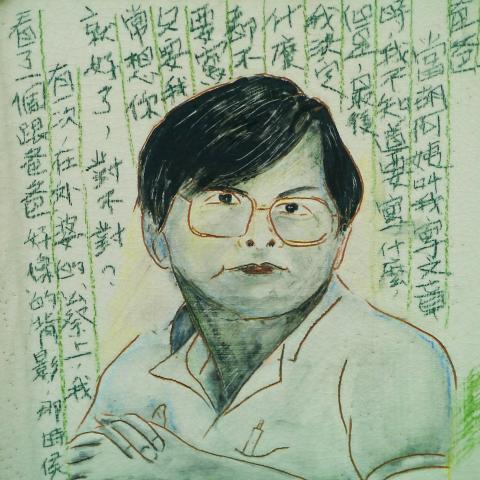An increasing number of young Taiwanese are taking an interest in the life and tragic end of Deng Nan-jung (鄭南榕), the executive director of the foundation named after the late democracy activist said yesterday on the 24th anniversary of Deng’s death by self-immolation.
The mood at the Deng Liberty Foundation, located on the recently renamed Freedom Lane in Taipei, was one of introspection as groups of people yesterday came to pay their respects to the former editor-in-chief of Freedom Era Weekly (自由時代週刊). Facing charges of sedition for his calls on the government to protect freedom of expression, Deng set himself ablaze in his office on April 7, 1989.
Ten years later, the same office, which by then had been turned into a human rights memorial hall, was opened to the public, showcasing a collection of photographs of Deng and other activists who fought for freedom in Taiwan under martial law. Hauntingly, Deng’s office remains as it was found after he committed the ultimate sacrifice, a reminder of a not-so-distant past.

Photo: J. Michael Cole, Taipei Times
Visitors yesterday honored the man by depositing red roses outside the charred room. A single white scarf, left behind by a Tibetan organization, graced the entrance to Deng’s study.
Addressing a group of several dozen visitors, foundation chief executive Tsao Chin-jung (曹欽榮) said he had observed in recent years a marked change in the interest among young people to learn more about Deng’s life and sacrifice.
He said the foundation was receiving more requests from students to visit it, to deepen their understanding of the man, whose Mainlander background had not diminished his commitment to Taiwan, as former president Chen Shui-bian (陳水扁), like Deng a former political prisoner, once said of him.
Thanks to the Internet and social media, interest in Deng’s life seems to be seeing a revival, Tsao said, adding that most young visitors today already had a fair understanding of Deng’s life and works.
Just as this correspondent was entering the memorial hall, he ran into Lin Fei-fan (林飛帆), a student leader who played a major role leading the anti-media monopoly movement against the attempted — now failed — acquisition of Next Media by a consortium that included Want Want China Times Group chairman Tsai Eng-meng (蔡衍明), whose close ties with the regime in Beijing have made him a controversial figure in the nation’s media environment.
Earlier in the day, Lin and several young activists had joined others during a ceremony at the Jinbaoshan Cemetery in New Taipei City (新北市) to honor Deng.
Young people have also sought other means to remember Deng. National Cheng Kung University’s 02 Group, whose members have pledged to continue to pursue the values that Deng sacrificed his life for, was scheduled to hold a candlelit vigil last night in memory of Deng.
Young Taiwanese were not the only ones who showed up to honor Deng. Following Tsao’s presentation at the foundation, a young Chinese student, who is studying at National Taiwan University, also made a brief speech.
Carrying a satchel he had just purchased from the foundation, the student said there were reasons to worry about Taiwan’s future, and he pointed to corruption within the Chinese Nationalist Party (KMT) as the main problem.

The manufacture of the remaining 28 M1A2T Abrams tanks Taiwan purchased from the US has recently been completed, and they are expected to be delivered within the next one to two months, a source said yesterday. The Ministry of National Defense is arranging cargo ships to transport the tanks to Taiwan as soon as possible, said the source, who is familiar with the matter. The estimated arrival time ranges from late this month to early next month, the source said. The 28 Abrams tanks make up the third and final batch of a total of 108 tanks, valued at about NT$40.5 billion

Two Taiwanese prosecutors were questioned by Chinese security personnel at their hotel during a trip to China’s Henan Province this month, the Mainland Affairs Council (MAC) said yesterday. The officers had personal information on the prosecutors, including “when they were assigned to their posts, their work locations and job titles,” MAC Deputy Minister and spokesman Liang Wen-chieh (梁文傑) said. On top of asking about their agencies and positions, the officers also questioned the prosecutors about the Cross-Strait Joint Crime-Fighting and Judicial Mutual Assistance Agreement, a pact that serves as the framework for Taiwan-China cooperation on combating crime and providing judicial assistance, Liang

A group from the Taiwanese Designers in Australia association yesterday represented Taiwan at the Midsumma Pride March in Melbourne. The march, held in the St. Kilda suburb, is the city’s largest LGBTQIA+ parade and the flagship event of the annual Midsumma Festival. It attracted more than 45,000 spectators who supported the 400 groups and 10,000 marchers that participated this year, the association said. Taiwanese Designers said they organized a team to march for Taiwan this year, joining politicians, government agencies, professionals and community organizations in showing support for LGBTQIA+ people and diverse communities. As the first country in Asia to legalize same-sex

MOTIVES QUESTIONED The PLA considers Xi’s policies toward Taiwan to be driven by personal considerations rather than military assessment, the Epoch Times reports Chinese President Xi Jinping’s (習近平) latest purge of the Chinese People’s Liberation Army (PLA) leadership might have been prompted by the military’s opposition to plans of invading Taiwan, the Epoch Times said. The Chinese military opposes waging war against Taiwan by a large consensus, putting it at odds with Xi’s vision, the Falun Gong-affiliated daily said in a report on Thursday, citing anonymous sources with insight into the PLA’s inner workings. The opposition is not the opinion of a few generals, but a widely shared view among the PLA cadre, the Epoch Times cited them as saying. “Chinese forces know full well that